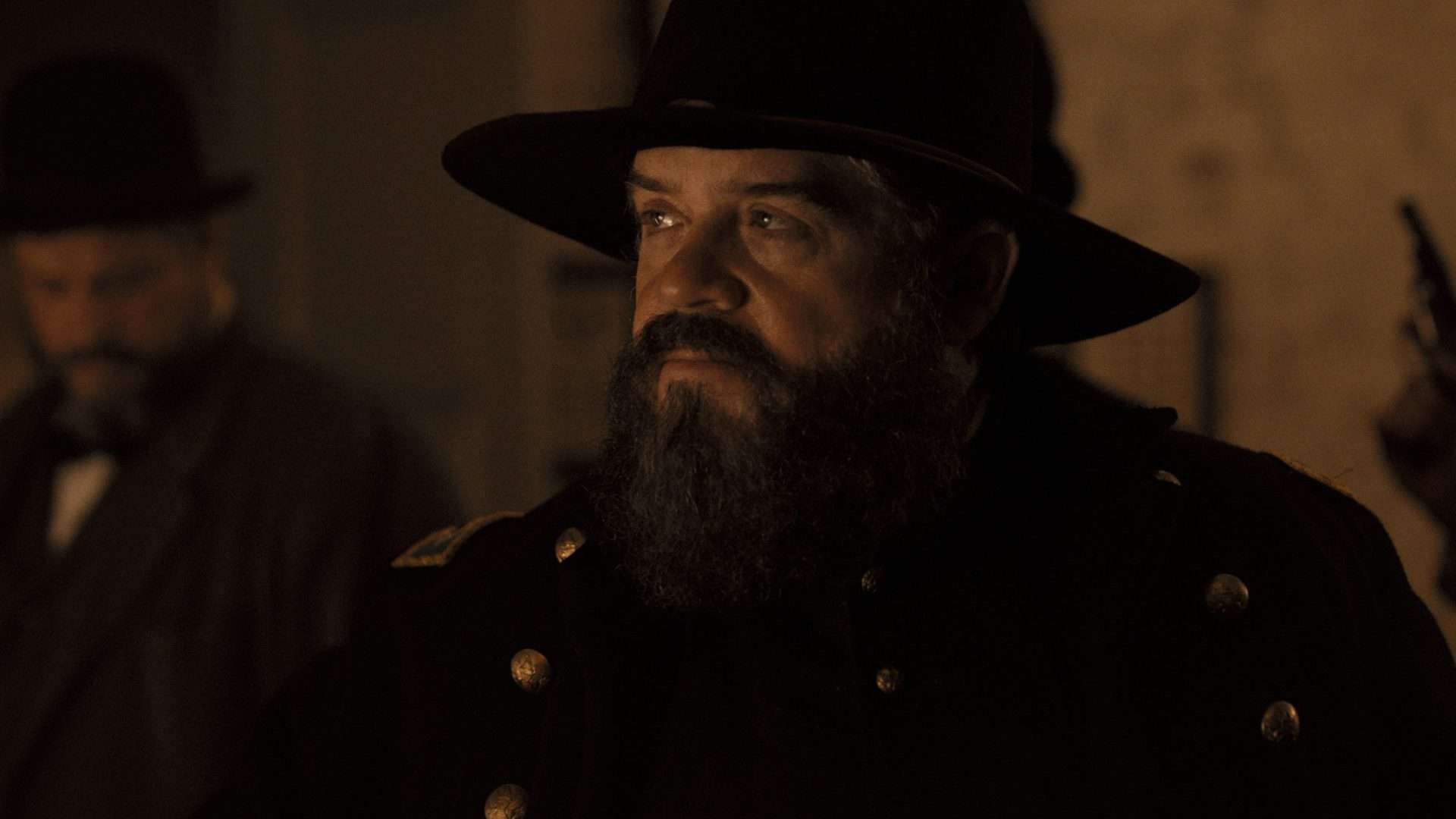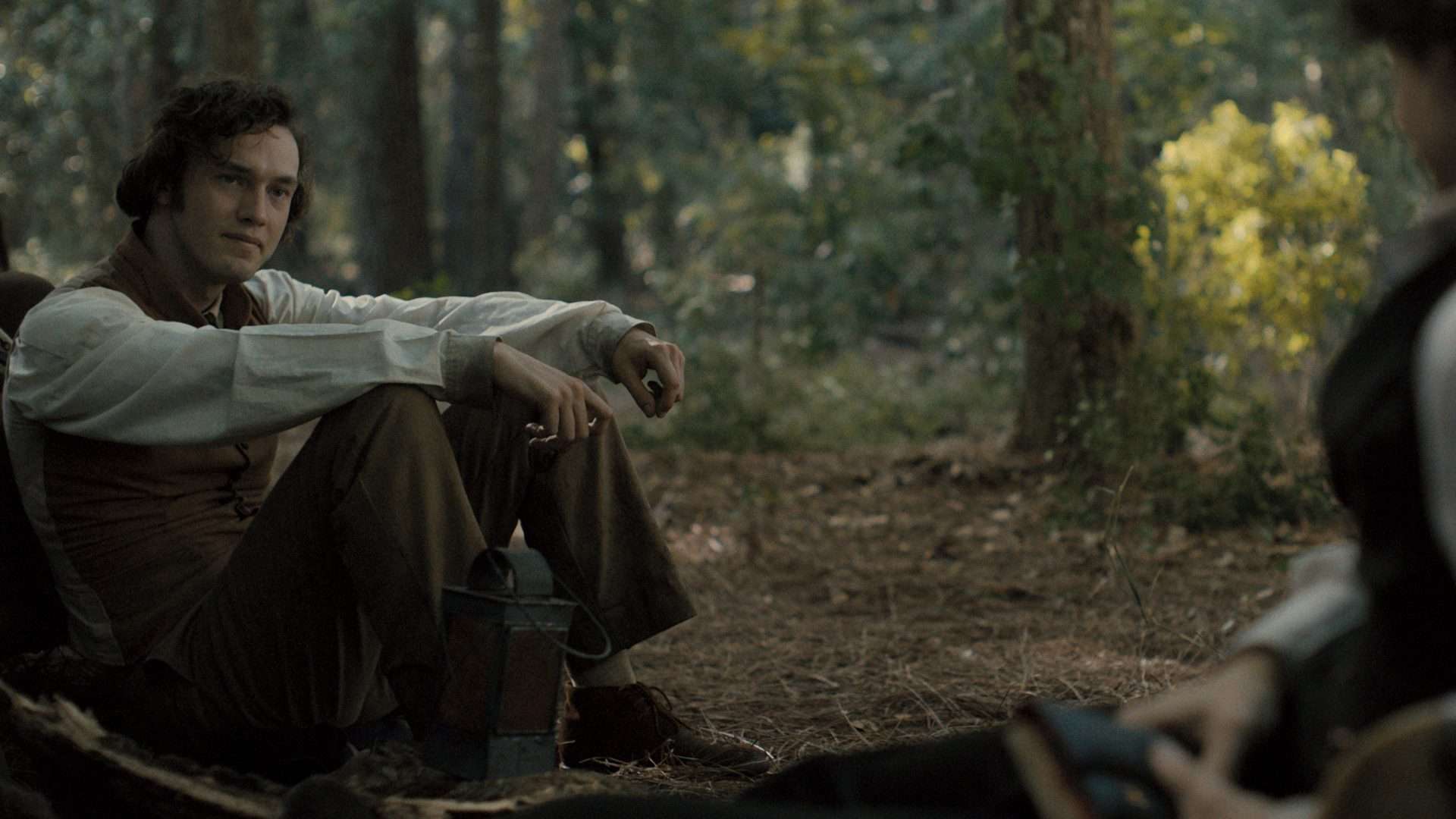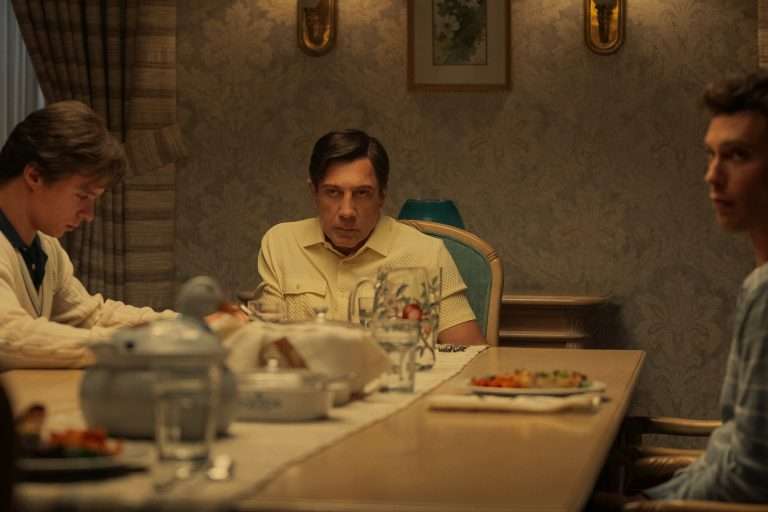I think it was pretty evident in the third episode, but by episode 4 of “Manhunt” (Season 1), it is quite clear that while the show is dealing with the hunt for John Wilkes Booth, it is more interested in the conspiracy to assassinate President Lincoln and destabilize the Union, such that the Confederacy could restart their ascension slowly and steadily. The Secret Line, which had been teased in the previous episode, becomes a marker in the conspiracy that is slowly brewing. Booth’s act had just fanned the flames, but the Confederate fire had been surreptitiously brewing.
Manhunt Episode 4 “The Secret Line” Recap
What is the response to Sanders’ incendiary news?
As it turns out, last week’s headline by Sanders’ newly acquired newspaper was a thinly veiled shot fired towards the War Department, specifically towards Stanton, who had presumably tried to assassinate Jefferson Davis, the President of the Confederates. Booth’s action is framed as a reactionary response to Stanton’s attempts, and now Baker and Stanton want Conover to frame that letter as a forgery. Conover, however, is still not convinced, even though he presumably agrees to the proposition. But as Stanton remarks to Baker once Conover walks away, this proposition needs to be a watertight one. Cornering Sanders with the assassination and linking him to Booth is the only way this ends.
What was the Manhattan Fire Plot?
On November 25, 1864, eight southern operatives collectively called the Confederate Army of Manhattan (the most unimaginative name) plotted to burn down New York City during the end of the Civil War by trying to burn down as many buildings in Manhattan as possible to overwhelm the fire brigade. However, as it turns out, the CAM were unsuccessful because they weren’t proficient enough to start these fires, and the fires that had been started would be quickly doused out.
According to “Manhunt,” Sanders had been the ringleader who had planned The Manhattan Fire Plot to convince New Yorkers of the cost of Lincoln’s “moral agenda” and to convince them to secede from the Union. We see one of the arsonists try to burn down the LaFarge Hotel only to be caught by the New York Police led by Baker, who knows that Sanders is involved and also knows that all these arsonists are on their way to Montreal.
The day of the Manhattan Fire Plot is also shown to be a connecting thread with the Booth brothers, Edwin and Wilkes. Most importantly, on the night of the Manhattan Fire Plot, both the Booth brothers were arguing about Wilkes’ participation in the play. Edwin believes that Wilkes’ presence sullies his reputation, as his presence in the Northern stages reminds viewers that Wilkes is a staunch supporter of the Confederacy.
Wilkes, on the other hand, is very much “apolitical” in that he wants to work anywhere he can and that his brother has no right to “condemn him to obscurity,” which his brother argues Wilkes is far more capable of doing himself due to his acting—a limited grab bag of self-anger or self-pity. Wilkes, stung by the insult, announces that he doesn’t need New York, Philadelphia, or Boston. He is going to play to the crowds that only support his cause. When Edwin tries to shush him, he taunts his brother, announcing that the “copperheads” are everywhere.
Where does the money lead to?
Stanton’s plan, as he explains to a federal judge, is to follow the money to prove that Sanders, the prime suspect in the Manhattan Fire Plot, has been funding Confederate operations. He is also indirectly responsible for the assassination and is believed to be a senior member of the Confederate Secret Service (CSS). Stanton believes that tracing the $500 that Booth had left at a Montreal bank controlled by CSS to Sanders would lead to the desired outcome.
Thus, he wants a search warrant to investigate Sanders’ properties, and because Stanton is aware that the local judges are in Stanton’s pocket, he needs federal assistance for conviction. Stanton strongly (and naively, if taken in the current context) believes that while justice is a commodity for millionaires, in America, no one is untouchable by the hands of the law. Perhaps that naivete was essential in that era because, truthfully, it rings almost comical in this era. The judge instead advises Stanton to stop the financial streams that are aiding Sanders.

To that end, Baker and his officers conduct a raid on the Gold Room, the Civil War era’s equivalent to the Stock Exchange, where the price of gold would be traded with the price of greenbacks or Union dollars, which had been subject to wild fluctuations during the Civil War. From the gold room, Baker manages to arrest all the “anti-Union robber barons,” one of them being Edwin Stanton’s first father-in-law, grandfather to Stanton’s oldest child, and current colleague in the war department, Eddie. Baker has, unfortunately, nothing to hold him or anything directly connecting him to Sanders, so he is forced to let him go.
What did Lincoln and Stanton converse in the fateful meeting three months before his assassination?
At the wake of Abraham Lincoln at West Village, Eddie is worried about the lack of security guards sent to escort the body to Philadelphia, while Mary Todd Lincoln entertains herself by listening to Edwin Booth monologuing a piece of his Hamlet performance. As Stanton enters, he learns from his son that Robert Lincoln is searching for mental institutions to admit his mother because of presumably her anxiety.
As Robert hears this, he flashes back to the conversation he and Lincoln had three months before Lincoln’s assassination. Mary Todd passionately pleaded with Abe to deny Robert the opportunity to join the war. Abe denied it, albeit with a nuance tinged with morality. They finally had to put the ball in Stanton’s court, where Stanton had to promise to let Robert serve in General Grant’s battalion, where his odds of survival would be higher.
Perhaps reminded of that, Stanton gives Robert a stern telling, empathizing that she needs his support more than ever. That meeting is also important in the grand scheme of the narrative that the episode chooses to cover, where Lincoln indirectly orders Stanton to assassinate Jefferson Davis to “estimate the shortest path to victory” and “rush into an endgame,” if only to stop the untold sufferings that American families had to bear.
What was the deal struck between Sanders and Johnson about?
A break-in at Stanton’s office in the Department of War reunites him with Baker, where Baker informs him that nothing has been taken (though it looks like the file containing evidence against Sanders might be, which Baker hurriedly hides). Baker also informs us that several of the traders confirm Sanders and their involvement in his “oil investment” schemes (oil investment is suspected to be a code word for the assassination, though it hasn’t been proven yet).
Baker also has no idea what Sanders meant by coming to an understanding with Johnson, but as it turns out, Stanton’s father-in-law. In a contentious lunch that Stanton has with his son and his father-in-law, his father-in-law informs him that Johnson has awarded the contract for the summer uniforms for the army to Sanders’ clothiers. Johnson, being intimidated by the violence in the south, supports the army staying there instead of returning home. That would mean the cotton value is up, and so is the price of gold, which revealed why he had been in the Gold Room trading.
A similar conversation is taking place between Sanders and Conover (disguised as John Wallace), where Conover remarks that Stanton knows about the deal. Conover informs Sanders that while Johnson can award the contract to Sanders over a few telegrams, it cannot be officially authorized without Stanton’s approval, as he approves the army’s uniform budget, which means Sanders wouldn’t get his money without that authorization.
Sanders, in a hurry to save 20%, might stand to lose it all until he makes a deal with the man hellbent on taking him down as the ringleader of a conspiracy. But money counts, so Stanton agrees to make a deal. Conover tries to sweeten the pot by helping to broker this deal for 10%, but Sanders wishes to make the deal directly, with Stanton alone at his office, not any neutral location.

However, one interesting piece of information comes to light. The security team assigned to Lincoln’s funeral had been admitted to the Union Hospital on account of contracting smallpox, a limited subset considering every other patient had influenza. The doctor remarked that all these soldiers had taken up dock work, but more importantly, they had new uniforms, not issued by the war department but received by these soldiers nonetheless. The kicker is that it seems suspiciously related to the yellow fever plot from last month that had been traced to a Confederate doctor. Unlike yellow fever, smallpox can be transmitted through clothing. The plot thickens when Robert learns from Doctor Hammond that the cloth has been supplied by Sanders Clothiers.
What happens at the meeting between Sanders and Stanton?
Stanton that night, while walking up to Sanders’ hotel, is attacked by a white masked assailant wearing the same mask that had been left behind in the war department office during its break-in. Stanton manages to fight back and push him away but is unable to chase him because his asthma returns with a vengeance. Composing himself, he meets with Sanders, where Stanton doesn’t mask his displeasure at having to deal with a clothier of his ilk, but he requires the whereabouts of John Wilkes Booth and, if that is not possible to exactly pinpoint, the map of the secret agents helping Booth escape.
If that is met, Stanton would honor the contract with an additional amount of a quarter to a million. However, as if realizing that no route would satisfy Sanders’ ultimate goal, he reveals that he could live off the “interest” alone and donate the clothes for free because he is a patriotic American. As for why he funded all the terrorist acts, he simply reiterates that this is his city, while the country belongs to the white man, and he won’t let Stanton give away this country without more of a fight.
As if emboldened (and clearly deliberately by Stanton, who furtively checks his watch), Sanders goes on, calling Stanton’s forgery angle pathetic, saying that the only person in this room who everyone thinks has planned an assassination is Stanton himself. It’s a loaded gun of a statement to throw, and Stanton doesn’t hesitate to throw it back and directly asks Sanders whether he had Abe killed. Sanders, perhaps tellingly, doesn’t respond. He instead points a gun at Stanton and remarks that there would be only one Lincoln, but there would always be unscrupulous capitalists like him. Booth and Sanders are only a symptom; this disease doesn’t have a cure.
As he points the gun, remarking that he would be called a hero for killing the man who had ordered Davis’ death, Stanton calmly asks him to fire and stands up with his hands raised, a bloody handkerchief on his right hand. He takes out a gun from his coat pocket, points it towards Sanders, and then shoots at the window. It had been a signal for Baker’s forces, lying in wait, to rush up to Sanders’ office and arrest him on charges of domestic violence and sabotage. Sanders threatens quite calmly that this will only be paperwork for them because he will be out quite soon.
Manhunt Episode 4 “The Secret Line” Ending Explained:
What is the Secret Line?
As Baker’s officers walk out of the building, we see Eddie, Stanton’s son, waiting for him. As Stanton walks out, Eddie informs him that the shipment is confirmed to have smallpox contamination in their uniforms. It’s contained, but Stanton reveals that this is a plot that Eddie uncovered, and now he needs the list. They race back to the docks and urge the soldiers to stop the shipment from burning. As Stanton checks all the clothier crates, Eddie finally discovers the distributors’ manifest from Bryantown to Richmond and realizes that this list is the secret line, with Sanders distributors being the CSS agents.
As the episode ends, we see Baker check the safe of Sanders, which contains Conovers’ secret identities as Wallace and other multiple identities. It seems that Sanders knew about Conover’s nom de guerre and had played along for reasons known only to him. We also see Booth, whom we had seen throughout the episode, waiting for the River Ghost to fetch him and Harold and take him to the river bank, trying to emphasize the importance of his journal and leave behind a mark of his legacy and as the River Ghost finally guides them to the bank, where a boat is waiting for them, he informs them that Virginia would welcome him.
The status quo is slowly beginning to converge as we see Mary, Dr. Mudd’s servant, finally revolt against his unjust treatment and run away to the lot she now owns. She plans to start a school and teach the kids what she has learned while also striving to progress her educational faculties concurrently. As the episode ends, we see Stanton and Eddie on horseback, riding towards Virginia as a new day dawns.




![Bingo Hell [2021] Review: An Unnecessary and Shambolic Horror film About Gentrification and Consumerism](https://79468c92.delivery.rocketcdn.me/wp-content/uploads/2021/10/Bingo-Hell-3-768x432.jpg)


![Sweat [2021] Review – A haunting albeit unfocused exploration of the perils of social media fame](https://79468c92.delivery.rocketcdn.me/wp-content/uploads/2021/08/Sweat-768x432.jpg)

